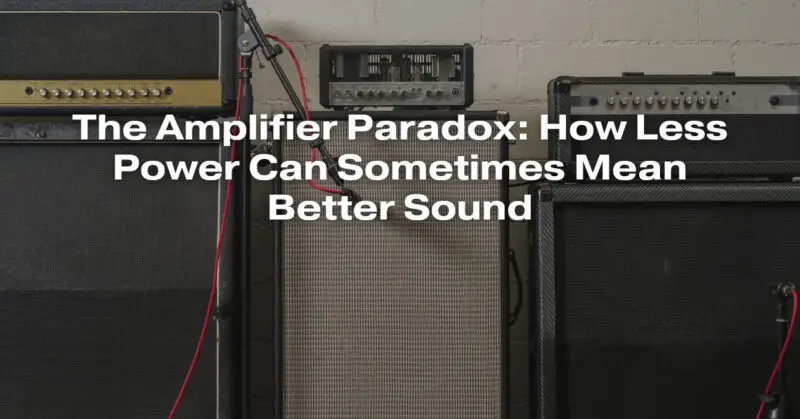In the world of audio amplification, the common belief is that more power equals better sound quality. However, this notion often overlooks a paradoxical truth: in many cases, less power can lead to better sound. In this article, we will explore the amplifier paradox, debunking the misconception that high wattage always equates to superior audio quality, and instead, highlighting the scenarios in which lower-power amplifiers can excel.
The Power vs. Sound Quality Paradox
The prevailing myth is that higher-wattage amplifiers deliver better sound quality, but this belief doesn’t tell the whole story. Here’s why:
- Distortion at High Volumes: Amplifiers pushed to their limits can introduce distortion, especially when paired with speakers that can’t handle the power. This distortion can significantly degrade sound quality and lead to listener fatigue.
- Inefficiency at Low Volumes: High-power amplifiers often require a certain volume level to reach their optimal performance. At lower volumes, they may operate less efficiently, resulting in a loss of detail and nuance in the audio.
- Mismatched Components: The synergy between an amplifier, speakers, and source equipment is crucial. Mismatched components can lead to sound quality issues, regardless of the amplifier’s power rating.
- Listening Environment: The acoustics of the listening space play a vital role in sound quality. A room’s size, shape, and acoustic treatment can affect how an amplifier interacts with the environment.
- Listener Preferences: Sound quality is subjective and varies from person to person. Some listeners prefer a more natural and uncolored sound, while others may enjoy the warmth or coloration introduced by certain amplifiers.
Factors That Influence Sound Quality
Instead of focusing solely on amplifier power, consider these factors that have a more significant impact on sound quality:
- Speaker Efficiency: The efficiency of your speakers can greatly influence how efficiently an amplifier delivers sound. Higher-efficiency speakers can produce the same volume with less power, reducing the risk of distortion.
- Amplifier Quality: The design, components, and overall quality of an amplifier can significantly impact sound quality. Well-designed, lower-power amplifiers can often outperform poorly designed, high-power ones.
- Room Acoustics: The acoustics of your listening space are essential. Proper room treatment, speaker placement, and acoustic considerations can dramatically improve sound quality.
- Source Material: The quality of your audio source, whether it’s a high-resolution audio file, vinyl record, or streaming service, can affect the level of detail and nuance in the music.
- Listening Levels: Consider your typical listening volumes. If you rarely listen at high volumes, a lower-power amplifier may be more suitable and cost-effective.
Matching Amplifier Power to Your Needs
To achieve the best sound quality, it’s essential to match the amplifier’s power to your specific requirements:
- Speaker Matching: Select speakers with a sensitivity rating that complements your amplifier’s power output. This ensures efficient power utilization and minimizes the risk of distortion.
- Listening Levels: Consider your typical listening volumes. If you rarely listen at high volumes, a lower-power amplifier may provide better sound quality at the levels you prefer.
- Room Size: Larger rooms may require more powerful amplifiers to fill the space with sound effectively. Smaller rooms may not benefit as much from high-wattage amplifiers.
- Quality Over Quantity: Prioritize amplifier quality over sheer power. A well-designed, lower-wattage amplifier can deliver exceptional sound quality without the risk of distortion.
Conclusion
The amplifier paradox challenges the belief that more power always leads to better sound quality. While amplifier power is undoubtedly important, it is just one piece of the puzzle. Achieving optimal sound quality requires considering the synergy between components, room acoustics, and personal preferences. Instead of chasing the highest wattage, thoughtful consideration and matching of amplifiers to specific needs and conditions can result in a more enjoyable and satisfying listening experience, even at lower power levels.


